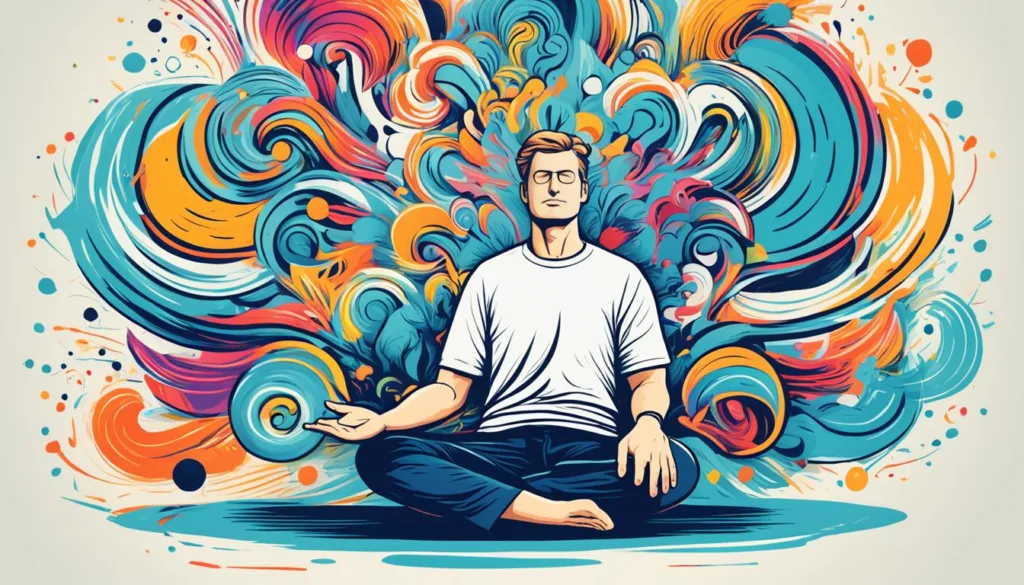In today’s fast-paced world, it’s easy to feel overwhelmed and disconnected from ourselves. But what if a simple practice could help you focus better and find peace? Welcome to the world of mindfulness.
Mindfulness is a practice that changes how you think, feel, and see the world. It helps you become more aware of yourself and live in the moment. This can reduce stress, improve focus, and bring you inner peace.

Key Takeaways
- Mindfulness is a powerful practice that can help you reduce stress, boost focus, and find lasting inner peace.
- By living in the present moment and developing a heightened sense of self-awareness, you can unlock your full potential and improve your overall well-being.
- Mindfulness has been shown to have numerous physical and mental health benefits, including reduced anxiety, improved emotional regulation, and enhanced cognitive function.
- Incorporating mindfulness into your daily life can be as simple as taking a few minutes each day to practice meditation or engage in mindful activities.
- With patience and consistent practice, you can cultivate a mindful mindset that can transform every aspect of your life.
Introduction to Mindfulness: A Life-Changing Practice
Mindfulness means being fully in the moment, not thinking about the past or future. It’s an old practice that helps reduce stress, improve focus, and bring more calm and well-being.
But what is mindfulness, and how does it change our lives? It’s simple yet deep – it’s about noticing the present with an open mind. This way, we can understand ourselves and the world better.
Mindfulness has many benefits. Studies show it can:
- Reduce stress and anxiety
- Improve focus and concentration
- Enhance emotional regulation and resilience
- Boost overall physical and mental well-being
Mindfulness helps us find peace and balance in our busy lives. By being fully present, we learn to appreciate the now. This brings clarity and happiness.
“Mindfulness is the basic human ability to be fully present, aware of where we are and what we’re doing, and not overly reactive or overwhelmed by what’s going on around us.” – Jon Kabat-Zinn, founder of Mindfulness-Based Stress Reduction (MBSR)
If you’re new to mindfulness or want to deepen your practice, this introduction is for you. It will give you a strong base to understand this powerful practice. Let’s start our journey into mindfulness together!
The Science Behind Mindfulness: How It Rewires Your Brain
Many studies show how mindfulness changes the brain. By being mindful, you can change your brain’s paths. This reduces fear and boosts areas for focus and managing feelings.
Understanding the Neural Pathways
Mindfulness, like meditation, changes the brain’s structure and function. It works on areas for attention, feelings, and knowing yourself. Over time, these areas get stronger, helping you stay focused and manage your feelings better.
The Benefits of a Mindful Mind
The neuroscience of mindfulness shows many benefits. Key advantages include:
- Reduced stress and anxiety
- Improved focus and concentration
- Enhanced emotional regulation and resilience
- Increased gray matter in the prefrontal cortex, leading to better decision-making and problem-solving
- Decreased activity in the amygdala, which is responsible for fear and stress responses
Learning how mindfulness and the brain work together can change your life. It brings many benefits for your well-being.
“Mindfulness isn’t just about learning to be present – it’s about learning to be present with kindness and compassion, to yourself and others.”
Research shows how how mindfulness changes the brain. This practice can greatly improve your mental, emotional, and physical health.
Techniques for Cultivating Mindfulness in Daily Life
Mindfulness isn’t just for meditation. You can add it to your daily life. Find mindfulness exercises and mindfulness practices that keep you in the moment. These techniques will help you become more mindful and change your life for the better.
Breath-Focused Exercises
One easy way to be mindful is through breath-focused exercises. Just take a few minutes to pause, close your eyes, and focus on your breathing. Notice how your body feels and the air moving in and out. This simple act can calm your mind, reduce stress, and keep you in the now.
Mindful Walking
Adding mindfulness exercises to your daily life can change everything. Try mindful walking by paying attention to your body as you move. Notice your feet touching the ground, your arms swinging, and your steps. This focus on the now can turn a simple walk into a mindful experience.
Mindful Eating
Mindful eating is another great way to practice mindfulness. When you eat, notice the food’s colors, textures, and smells. Eat slowly, enjoy each bite, and feel your body getting nourished. This way, you’ll enjoy your food more and be fully present.
To be more mindful, start small and add these techniques to your day. With regular practice, you’ll see the big benefits of mindfulness. You’ll feel more peaceful, focused, and happy.
Mindfulness: The Key to Lasting Inner Peace
Living mindfully can bring deep inner peace and emotional well-being. It teaches you to handle stress, control your feelings, and enjoy the now. This leads to a happier and more peaceful life.
Mindfulness means being fully in the moment and aware of what’s happening. It’s not about thinking about the past or worrying about the future. You focus on what’s happening right now, without judging your thoughts or feelings.
One big plus of mindfulness is it reduces stress and anxiety. By paying attention to your breath, body, and surroundings, you can stop the stress response. This turns on the calm part of your nervous system, helping you relax.
It also helps you understand and accept your feelings better. Instead of avoiding tough emotions, you learn to notice them, explore them, and let them go. This way, you can improve your mood, have better relationships, and feel more peaceful inside.
“Mindfulness is not about getting anywhere else, but about being fully present, alive, and aware in this very moment.” – Jon Kabat-Zinn
Mindfulness also makes you happier and more fulfilled. By enjoying the little things in life and being thankful, you focus on what you have, not what you lack. This makes you more positive and content.
Adding mindfulness to your daily life is easy. Simple things like deep breathing, a mindful walk, or short meditation can greatly improve your mental and emotional health.
Unlocking the Power of Mindfulness
To really benefit from mindfulness for lasting peace, try these tips:
- Make a regular mindfulness practice, like meditation or deep breathing.
- Keep a beginner’s mind, always being curious and open.
- Treat yourself kindly and with understanding.
- Do mindful activities, such as eating, walking, or cleaning with focus.
- Be around people who support and encourage your mindful path.
By making mindfulness a part of your life, you can find deep inner peace, emotional well-being, and lasting happiness.
| Benefits of Mindfulness | Impact on Inner Peace |
|---|---|
| Stress reduction | Makes you calmer and more balanced |
| Emotional regulation | Helps you manage and accept hard feelings |
| Increased happiness | Makes you appreciate the present more |
| Enhanced self-awareness | Helps you understand and accept yourself better |
By using mindfulness, you can find lasting peace and emotional well-being. This leads to a more fulfilling and peaceful life.
Overcoming Distractions: Staying Present in a Busy World
In today’s fast-paced world, staying focused is hard. But, mindfulness can help you stay present and in control. It teaches you to notice and handle distractions. This way, you can be more productive and clear-headed.
Identifying and Managing Triggers
First, figure out what distracts you. This could be your phone buzzing or your own thoughts. Knowing what distracts you is key.
After knowing your distractions, you can manage them. Set limits on your phone or take short breaks to breathe. Adding mindfulness to your day can help too.
Being aware of what distracts you and using strategies to deal with it helps you stay focused. Mindfulness and distractions, mindfulness and focus, mindfulness and productivity work together. Mastering this can bring you peace and success.
“The ability to be in the present moment is a major component of mental wellness.” – Abraham Maslow
- Identify your triggers: Become aware of the external and internal factors that cause your mind to wander.
- Implement strategies to manage distractions: Set boundaries, limit digital device use, and incorporate mindfulness practices into your daily routine.
- Train your mind to stay focused: With consistent practice, you can develop the ability to maintain a clear and present state of mind, even in the face of distractions.
Using mindfulness to beat distractions can make you more productive and peaceful. Try this powerful practice and see how it changes your life.
Mindfulness for Stress Relief and Emotional Well-being
In today’s fast-paced world, managing stress and keeping up emotional well-being is tough. But, mindfulness can help. It’s about being fully present and accepting, without judgment. This practice is great for handling stress, anxiety, and depression.
Mindfulness makes you more aware of yourself and helps you accept things as they are. It makes life’s ups and downs easier to handle. With regular practice, you can learn better ways to cope, understand your feelings, and find peace.
Mindfulness and Stress Management
Stress is a big problem today, affecting our health. But, mindfulness can fight it. It teaches you to be aware of now without judging. This helps you handle stress better, without getting anxious or panicked.
- Practices like deep breathing and body scans calm your body’s stress response. This reduces the bad effects of stress.
- Mindfulness makes you more aware of what stresses you out. This helps you find better ways to deal with it.
- It also lowers stress-related problems like high blood pressure and chronic pain.
Mindfulness and Emotional Well-being
Mindfulness does more than just help with stress. It also makes you feel better emotionally. It helps you be kind to yourself and understand your feelings better.
- It can make anxiety and depression worse by stopping negative thinking and keeping you in the moment.
- Regular practice builds self-compassion. This means being kind to yourself and bouncing back from hard times.
- It also makes you smarter about emotions. This helps you handle your feelings and those of others, leading to better relationships.
If you want to reduce stress or feel emotionally better, mindfulness is a great choice. It helps you stay in the moment and find inner peace. This way, you can face life’s challenges with more strength and calm.

| Benefits of Mindfulness | Stress Management | Emotional Well-being |
|---|---|---|
| Physiological Calm | Reduced Symptoms of Stress-related Conditions | Alleviated Symptoms of Anxiety and Depression |
| Increased Self-awareness | More Effective Coping Strategies | Enhanced Self-compassion |
| Promotion of Inner Peace | Greater Clarity and Composure | Improved Emotional Intelligence |
“Mindfulness is not about getting anywhere else, but about being where you already are.” – Jon Kabat-Zinn
Integrating Mindfulness into Your Routine: Tips and Strategies
Adding mindfulness daily practice to your busy life is easy with a few simple steps. You can make this powerful practice part of your everyday life. This way, you’ll enjoy more focus, calm, and presence.
Creating a Mindful Environment
To start mindfulness habits, make a space that helps your practice grow. Here are some tips:
- Choose a quiet spot in your home or office for your mindfulness exercises.
- Fill your space with things that make you feel calm, like candles, plants, or art.
- Try using scents like lavender or frankincense to make your meditation better.
- Make sure your space is comfy and set up so you can sit or relax easily.
Creating a mindfulness lifestyle with your environment makes it easier to practice regularly. It helps you stay in the moment.
| Tip | Benefit |
|---|---|
| Designate a quiet space | Reduces distractions and enhances focus |
| Incorporate calming elements | Promotes a sense of relaxation and tranquility |
| Ensure physical comfort | Allows for longer, more enjoyable practice sessions |
By using these tips, you’ll create a mindfulness-friendly space. This space will support your growth and well-being.
“When you change the way you look at things, the things you look at change.”
– Wayne Dyer
The Transformative Power of Mindfulness in Relationships
Mindfulness is the art of being fully present and attentive. It can change our personal and professional relationships. By practicing this, we can understand, empathize, and connect deeply with others.
Mindfulness and Relationships: Being mindful helps us tune into others’ thoughts, feelings, and experiences. This makes us better at communicating and responding with kindness. It helps us build strong, meaningful connections.
Mindfulness and Communication: Mindful communication means listening well, being aware of emotions, and speaking our minds. By focusing on now, we have deeper conversations, solve problems better, and get closer to our loved ones.
Mindfulness and Empathy: Mindfulness lets us see things from others’ viewpoints and feel their feelings. This builds compassion, making relationships at home and work more rewarding and peaceful.
“Mindfulness is not just about being present in the moment; it’s about being present with the people we love and care about, and cultivating the deep connection that comes from truly seeing and understanding one another.”
Adding mindfulness to our relationships makes dealing with people easier and more graceful. It helps us strengthen family and friend bonds and work better with others at work. Mindfulness truly changes how we connect with people.

Start your mindful relationship journey today. Bring more presence, understanding, and kindness into your interactions. Watch as your connections grow and flourish.
Conclusion: Embracing a Mindful Lifestyle
Starting a mindful lifestyle is a journey of self-discovery and growth. By adding mindfulness to your daily life, you gain a deep sense of calm and clarity. This can change how you see and experience everything around you.
Mindfulness is a strong way to fight the stress and distractions of today’s world. It helps you stay in the moment and handle life’s ups and downs better. This leads to better relationships, smarter choices, and a deeper love for the world’s beauty.
Being mindful isn’t about being perfect. It’s about being kind to yourself and always growing. Small, steady steps towards mindfulness can lead to big changes in you and your surroundings. Start this path and discover the real power of living mindfully.
FAQ
What is mindfulness and how can it benefit me?
Mindfulness means being fully in the moment. It helps reduce stress and improve focus. It also makes you feel more calm and well.
How does mindfulness rewire the brain?
Studies show mindfulness changes the brain. It lessens fear and boosts thinking and feeling control. This happens by changing brain paths.
What are some techniques for incorporating mindfulness into my daily life?
You can add mindfulness to your day with simple exercises. Try focusing on your breath or walking mindfully. These help you stay present.
How can mindfulness help me manage stress and improve my emotional well-being?
Mindfulness helps with stress and negative feelings. It teaches you to notice your thoughts and feelings without judgment. This leads to better emotional balance.
How can I create a mindful environment and develop sustainable mindfulness habits?
Making mindfulness part of your life is easy. Find tips to add mindfulness to your day. Learn how to make your space and habits support mindfulness.
How can mindfulness improve my relationships?
Mindfulness makes relationships better by building understanding and empathy. Use mindfulness in your personal and work life for more meaningful connections.












